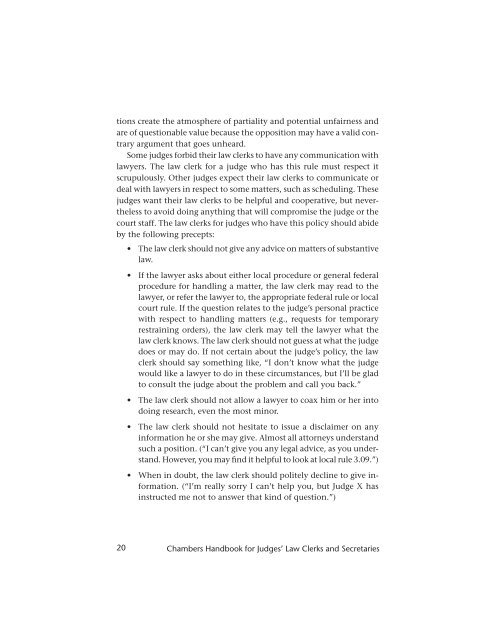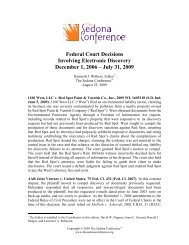Chambers Handbook for Judges - Federal Judicial Center
Chambers Handbook for Judges - Federal Judicial Center
Chambers Handbook for Judges - Federal Judicial Center
You also want an ePaper? Increase the reach of your titles
YUMPU automatically turns print PDFs into web optimized ePapers that Google loves.
tions create the atmosphere of partiality and potential unfairness and<br />
are of questionable value because the opposition may have a valid contrary<br />
argument that goes unheard.<br />
Some judges <strong>for</strong>bid their law clerks to have any communication with<br />
lawyers. The law clerk <strong>for</strong> a judge who has this rule must respect it<br />
scrupulously. Other judges expect their law clerks to communicate or<br />
deal with lawyers in respect to some matters, such as scheduling. These<br />
judges want their law clerks to be helpful and cooperative, but nevertheless<br />
to avoid doing anything that will compromise the judge or the<br />
court staff. The law clerks <strong>for</strong> judges who have this policy should abide<br />
by the following precepts:<br />
• The law clerk should not give any advice on matters of substantive<br />
law.<br />
• If the lawyer asks about either local procedure or general federal<br />
procedure <strong>for</strong> handling a matter, the law clerk may read to the<br />
lawyer, or refer the lawyer to, the appropriate federal rule or local<br />
court rule. If the question relates to the judge’s personal practice<br />
with respect to handling matters (e.g., requests <strong>for</strong> temporary<br />
restraining orders), the law clerk may tell the lawyer what the<br />
law clerk knows. The law clerk should not guess at what the judge<br />
does or may do. If not certain about the judge’s policy, the law<br />
clerk should say something like, “I don’t know what the judge<br />
would like a lawyer to do in these circumstances, but I’ll be glad<br />
to consult the judge about the problem and call you back.”<br />
• The law clerk should not allow a lawyer to coax him or her into<br />
doing research, even the most minor.<br />
• The law clerk should not hesitate to issue a disclaimer on any<br />
in<strong>for</strong>mation he or she may give. Almost all attorneys understand<br />
such a position. (“I can’t give you any legal advice, as you understand.<br />
However, you may find it helpful to look at local rule 3.09.”)<br />
• When in doubt, the law clerk should politely decline to give in<strong>for</strong>mation.<br />
(“I’m really sorry I can’t help you, but Judge X has<br />
instructed me not to answer that kind of question.”)<br />
20 <strong>Chambers</strong> <strong>Handbook</strong> <strong>for</strong> <strong>Judges</strong>’ Law Clerks and Secretaries

















